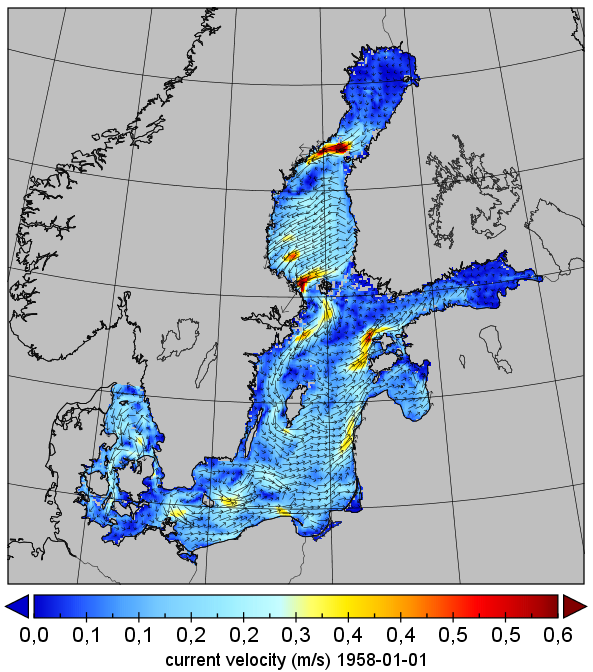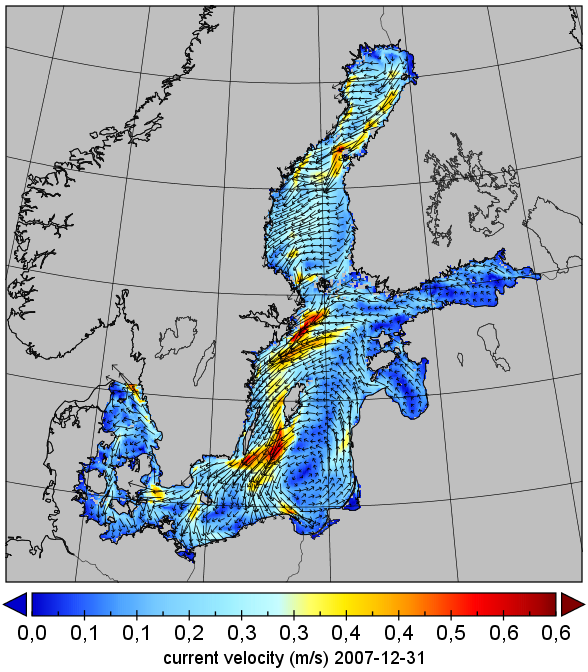Description
The dataset contains the results of numerical modelling of currents over a period of 50 years (1958-2007) in the Baltic Sea (Jędrasik and Kowalewski, 2019). A long-term hindcast simulation was performed using a three-dimensional hydrodynamic model PM3D (Kowalewski and Kowalewska-Kalkowska, 2017), a new version of the M3D model (Kowalewski, 1997).
The model is based on the Princeton Ocean Model (POM) developed at Princeton University (Blumberg and Mellor, 1987). Like POM, the M3D/PM3D model uses the Mellor-Yamada turbulence scheme and sigma vertical coordinates. The simulation was carried out in a rectangular grid of 3' (latitude) and 6' (longitude) resolution. The spatial resolution was 3 nautical miles, i.e. about 5.5 km. An open boundary was located between the Skagerrak and the Kattegat along the parallel connecting Skagen and Göteborg, where the water exchange with the North Sea takes place. A radiation condition based on Somerfield’s concept for velocities vertically averaged and normal to the boarder plane was applied. Atmospheric forcing for the period 1958-2007 was performed using the regional at amospheric climate model REMO (REgional MOdel) which was based on the numerical weather prediction model EM (Europa-Model) of the German Weather Forecast Service (DWD).
The eastward and northward components of surface currents and at a depth of 5 m, 10 m, 15 m, 20 m, 30 m, 40 m, 50 m and 60 m m were recorded every three hours in the computational grid of the model in unproiected form: LatLong, WGS 84 (EPSG: 4326). Analysis of the Baltic Sea current data spanning five decades showed a higher stability of subsurface current eddies relative to the stability of ephemeral surface currents (Jędrasik and Kowalewski, 2019).
Kowalewski M.;1997; A three-dimensional, hydrodynamic model of the Gulf of Gdańsk; Oceanol. Stud., 26 (4); 77–98
Kowalewski M., Kowalewska-Kalkowska H., 2017, Sensitivity of the Baltic Sea level prediction to spatial model resolution, Journal of Marine Systems 173, 101–113, http://dx.doi.org/10.1016/j.jmarsys.2017.05.001
Jędrasik J., Kowalewski M., 2019, Mean annual and seasonal circulation patterns and long-term variability of currents in the Baltic Sea, J. Mar. Syst., 193, 1-26, doi:10.1016/j.jmarsys.2018.12.011


Dataset file
hexmd5(md5(part1)+md5(part2)+...)-{parts_count} where a single part of the file is 512 MB in size.Example script for calculation:
https://github.com/antespi/s3md5
File details
- License:
-
open in new tab
CC BY-NC-SANon-commercial - Share-alike - Software:
- Software for Manipulating or Displaying NetCDF Data
Details
- Year of publication:
- 2020
- Verification date:
- 2020-12-17
- Creation date:
- 2017
- Dataset language:
- English
- DOI:
- DOI ID 10.34808/4tx1-0476 open in new tab
- Series:
- Verified by:
- Gdańsk University of Technology
Keywords
References
- publication A three-dimensional, hydrodynamic model of the Gulf of Gdańsk
- publication 44 Years Hindcast of the sea level and circulation in the Baltic Sea
- publication Mean annual and seasonal circulation patterns and long-term variability of currents in the Baltic Sea
- publication Sensitivity of the Baltic Sea level prediction to spatial model resolution
- dataset Long-term hindcast simulation of water temperature and salinity in the Baltic Sea
- dataset Long-term hindcast simulation of sea level in the Baltic Sea
- dataset Long-term hindcast simulation of sea level in the Baltic Sea
- dataset Long-term hindcast simulation of sea ice in the Baltic Sea
Cite as
Authors
Version this document has several versions
-
version 2.0release date 2021-03-31
-
Current versionversion 1.0release date 2020-12-17
seen 259 times

